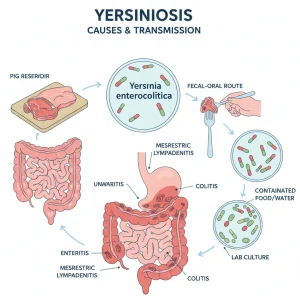Overview
Yersiniosis is an infection caused by bacteria of the genus Yersinia, most commonly Yersinia enterocolitica. The infection usually affects the digestive system and is a cause of gastroenteritis. Yersiniosis is more common in infants and children, but it can occur at any age.
People usually get yersiniosis by eating contaminated food, especially undercooked pork, or by drinking unpasteurized milk. Infection also can occur after contact with infected animals or contaminated water. Most cases are mild and get better on their own, but some people may develop more serious illness or complications.
Symptoms often appear a few days after exposure and may last one to three weeks. Treatment depends on the severity of illness and the person’s overall health.
Symptoms
Symptoms of yersiniosis vary by age and severity of infection. They may include:
-
Diarrhea, which may be bloody in some cases
-
Abdominal pain and cramping
-
Fever
-
Nausea and vomiting
-
Loss of appetite
In older children and adults, pain may be concentrated in the lower right abdomen, which can resemble appendicitis. Infants and young children are more likely to have diarrhea and fever.
Symptoms typically begin four to seven days after exposure and can last up to three weeks.
Causes
Yersiniosis is caused by infection with Yersinia bacteria. The most common source is Yersinia enterocolitica.
Common ways the infection spreads include:
-
Eating raw or undercooked pork products
-
Drinking unpasteurized milk or untreated water
-
Handling contaminated food and then touching the mouth
-
Contact with infected animals or their feces
The bacteria can survive in cold environments, including refrigerators, which allows them to contaminate food that is not properly cooked.
Risk factors
Factors that increase the risk of yersiniosis include:
-
Being an infant or young child
-
Eating undercooked pork, especially chitterlings
-
Drinking unpasteurized milk
-
Poor hand hygiene during food preparation
-
Exposure to infected animals
-
Weakened immune system
People with iron overload conditions, such as hemochromatosis, may be at higher risk for severe infection.
Complications
Most people recover fully from yersiniosis. However, complications can occur, especially in severe cases or high-risk individuals. Possible complications include:
-
Dehydration due to prolonged diarrhea
-
Reactive arthritis, which can cause joint pain and swelling weeks after infection
-
Bloodstream infection in people with weakened immune systems
-
Skin rash known as erythema nodosum
In rare cases, the infection can become life-threatening if it spreads beyond the intestines.
Prevention
Yersiniosis can often be prevented with good food safety and hygiene practices, including:
-
Cooking pork thoroughly until it reaches a safe internal temperature
-
Avoiding raw or unpasteurized milk and dairy products
-
Washing hands with soap and water after handling raw meat, animals, or diapers
-
Preventing cross-contamination between raw meat and other foods
-
Using clean water for drinking and food preparation
Practicing safe food handling and good hygiene is the most effective way to reduce the risk of yersiniosis.
Advertisement

